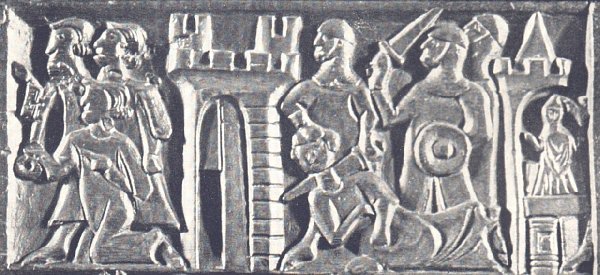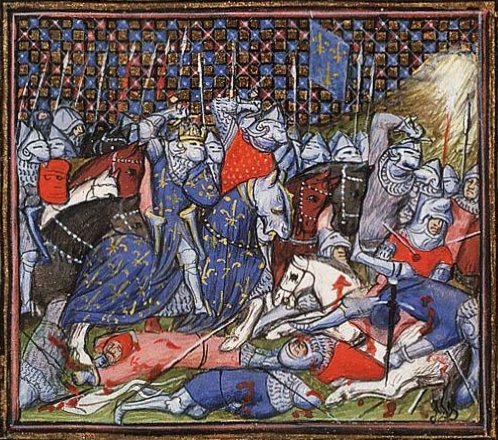|
Jan Heem
Jan Heem (end 13th century – beginning 14th century) was a Flemish craftsman and politician. He was co-leader of the Bruges Matins massacre of 1302Verbruggen, J, & Falter, R. (2002) 1302: Opstand in Vlaanderen. . but does not appear with Jan Breydel and Pieter de Coninck on the statue that stands in the marketplace of Bruges. When the rebels took over the city of Bruges in March 1302, he was appointed as mayor In many countries, a mayor is the highest-ranking official in a municipal government such as that of a city or a town. Worldwide, there is a wide variance in local laws and customs regarding the powers and responsibilities of a mayor as well .... He was a simple guildsman who was often seen at the side of Pieter de Coninck. During the period 1323 - 1328, and at the Battle of Cassel, Jan Heem was one of the leaders of Bruges. References {{DEFAULTSORT:Heem, Jan Mayors of Bruges Revolts involving Flanders 14th-century people from the county of Flanders ... [...More Info...] [...Related Items...] OR: [Wikipedia] [Google] [Baidu] |
County Of Flanders
The County of Flanders was a historic territory in the Low Countries. From 862 onwards, the counts of Flanders were among the original twelve peers of the Kingdom of France. For centuries, their estates around the cities of Ghent, Bruges and Ypres formed one of the most affluent regions in Europe. Up to 1477, the area under French suzerainty was west of the Scheldt and was called "Royal Flanders" (Dutch: ''Kroon-Vlaanderen'', French: ''Flandre royale''). Aside from this, the counts, from the 11th century onward, held land east of the river as a fief of the Holy Roman Empire: "Imperial Flanders" (''Rijks-Vlaanderen'' or ''Flandre impériale''). Part of the Burgundian Netherlands from 1384, which had a complex relation with France, the whole county fell to the Empire after the Peace of Madrid in 1526 and the Peace of the Ladies in 1529. Having already regained much, by 1795, the rest – within the Austrian Netherlands – was acquired likewise by France under the Frenc ... [...More Info...] [...Related Items...] OR: [Wikipedia] [Google] [Baidu] |
Politician
A politician is a person active in party politics, or a person holding or seeking an elected office in government. Politicians propose, support, reject and create laws that govern the land and by an extension of its people. Broadly speaking, a politician can be anyone who seeks to achieve political power in a government. Identity Politicians are people who are politically active, especially in party politics. Political positions range from local governments to state governments to federal governments to international governments. All ''government leaders'' are considered politicians. Media and rhetoric Politicians are known for their rhetoric, as in speeches or campaign advertisements. They are especially known for using common themes that allow them to develop their political positions in terms familiar to the voters. Politicians of necessity become expert users of the media. Politicians in the 19th century made heavy use of newspapers, magazines, and pamphlets, as well ... [...More Info...] [...Related Items...] OR: [Wikipedia] [Google] [Baidu] |
Bruges Matins (massacre)
The Matins of Bruges ( nl, Brugse Metten) was the nocturnal massacre of the French garrison in Bruges and their supporters, a political faction in favour of French rule, on 18 May 1302 by the members of the local Flemish militia. It has been named "Matins" (after a monastic liturgy) in analogy to the Sicilian Vespers of 1282. The revolt led to the Battle of the Golden Spurs, which saw the Flemish militia defeat French troops on 11 July 1302. Background Towns in Flanders had held the exclusive rights for the importation of sheep's wool from England. This made the merchants that comprised the bourgeosie very rich and powerful, so much so that they were able to force Margaret II, the Countess of Flanders, to allow them to become autonomous communities. This put the commoners in direct conflict with the nobles in the cities. When Margaret abdicated in 1278 to her son Guy of Dampierre, the nobles sought an alliance with the French king Philip the Fair (Flanders being a vass ... [...More Info...] [...Related Items...] OR: [Wikipedia] [Google] [Baidu] |
Jan Breydel
Jan Breydel (; between 1328 and 1333) is credited with leading the Bruges Matins (''Brugse Metten''), a violent uprising against Philip the Fair. He is said to have played a major role in the Franco-Flemish War, even though his authenticity has since been questioned. Personal life Not much is known about the personal life of Jan Breydel. Neither his date of birth, nor the date of his death are known for certain. Breydel learned the trade of butcher and lived in Bruges at the time of the uprising. He is said to have originated from a wealthy family. Combats Breydel is believed to have led the Bruges Matins together with Pieter de Coninck, a weaver, on the night of 17 to 18 May 1302. They invaded a French garrison and killed several distinguished Leliaards (patricians loyal to the king of France). About three weeks before, on 1 May that year, they had participated in an attack on Male Castle and the complete annihilation of the French garrison there. The city archives of Bruges ... [...More Info...] [...Related Items...] OR: [Wikipedia] [Google] [Baidu] |
Pieter De Coninck
Pieter de Coninck (died 1332 or 1333) was a weaver from Bruges well known for his role in the events surrounding the Battle of the Golden Spurs. He was not the head of the weavers' guild as is popularly believed (mostly because he was portrayed as such in the novel ''The Lion of Flanders'' by Hendrik Conscience). Together with Jan Breydel, a butcher, he was in the forefront of the popular uprising that led to the Battle of the Golden Spurs. Right before that battle he was knighted together with two of his sons. Before the Battle of the Golden Spurs began he was seen by the city government of Bruges as a dangerous oproerkraaier and was imprisoned in June 1301. He was freed by the people of Bruges. Afterwards, the ''Leliaarts'', a political faction supporting French rule, took over control of the city. Jacques de Châtillon, the then appointed governor of County of Flanders, entered Bruges with a small force and de Coninck was banished. Urged on by John I, Marquis of Namur, d ... [...More Info...] [...Related Items...] OR: [Wikipedia] [Google] [Baidu] |
Bruges
Bruges ( , nl, Brugge ) is the capital and largest City status in Belgium, city of the Provinces of Belgium, province of West Flanders in the Flemish Region of Belgium, in the northwest of the country, and the sixth-largest city of the country by population. The area of the whole city amounts to more than 13,840 hectares (138.4 km2; 53.44 sq miles), including 1,075 hectares off the coast, at Zeebrugge (from , meaning 'Bruges by the Sea'). The historic city centre is a prominent World Heritage Site of UNESCO. It is oval in shape and about 430 hectares in size. The city's total population is 117,073 (1 January 2008),Statistics Belgium; ''Population de droit par commune au 1 janvier 2008'' (excel-file) Population of all municipalities in Belgium, as of 1 ... [...More Info...] [...Related Items...] OR: [Wikipedia] [Google] [Baidu] |
Mayor
In many countries, a mayor is the highest-ranking official in a municipal government such as that of a city or a town. Worldwide, there is a wide variance in local laws and customs regarding the powers and responsibilities of a mayor as well as the means by which a mayor is elected or otherwise mandated. Depending on the system chosen, a mayor may be the chief executive officer of the municipal government, may simply chair a multi-member governing body with little or no independent power, or may play a solely ceremonial role. A mayor's duties and responsibilities may be to appoint and oversee municipal managers and employees, provide basic governmental services to constituents, and execute the laws and ordinances passed by a municipal governing body (or mandated by a state, territorial or national governing body). Options for selection of a mayor include direct election by the public, or selection by an elected governing council or board. The term ''mayor'' shares a linguistic ... [...More Info...] [...Related Items...] OR: [Wikipedia] [Google] [Baidu] |
Battle Of Cassel 1328
On 23 August 1328, the Battle of Cassel took place near the city of Cassel, 30 km south of Dunkirk in present-day France. Philip VI ( King of France from 1328 to 1350) fought Nicolaas Zannekin, a wealthy farmer from Lampernisse. Zannekin was the leader of a band of Flemish rebels. The fighting erupted over taxation and punitive edicts of the French over the Flemish. The battle was won decisively by the French. Zannekin and about 3,200 Flemish rebels were killed in the battle. Beginnings The Count of Flanders, Louis I, was collecting taxes for Charles IV of France. Residents of the bailiwicks of Veurne, St. Winoksbergen, Belle, Kassel, Poperinge and Bourbourg united and refused to pay. The Count threatened reprisals and the people rioted, under the leadership of Nicolaas Zannekin. In 1325, Zannekin captured Nieuwpoort, Veurne and Ypres. He also captured Kortrijk and the Count of Flanders himself. Later attempts to capture Ghent and Oudenaarde failed. In February ... [...More Info...] [...Related Items...] OR: [Wikipedia] [Google] [Baidu] |
Mayors Of Bruges
In many countries, a mayor is the highest-ranking official in a municipal government such as that of a city or a town. Worldwide, there is a wide variance in local laws and customs regarding the powers and responsibilities of a mayor as well as the means by which a mayor is elected or otherwise mandated. Depending on the system chosen, a mayor may be the chief executive officer of the municipal government, may simply chair a multi-member governing body with little or no independent power, or may play a solely ceremonial role. A mayor's duties and responsibilities may be to appoint and oversee municipal managers and employees, provide basic governmental services to constituents, and execute the laws and ordinances passed by a municipal governing body (or mandated by a state, territorial or national governing body). Options for selection of a mayor include direct election by the public, or selection by an elected governing council or board. The term ''mayor'' shares a linguistic or ... [...More Info...] [...Related Items...] OR: [Wikipedia] [Google] [Baidu] |
Revolts Involving Flanders
In political science, a revolution (Latin: ''revolutio'', "a turn around") is a fundamental and relatively sudden change in political power and political organization which occurs when the population revolts against the government, typically due to perceived oppression (political, social, economic) or political incompetence. Revolutions have occurred throughout human history and vary widely in terms of methods, duration, and motivating ideology. Their results include major changes in culture, economy, and socio-political institutions, usually in response to perceived overwhelming autocracy or plutocracy. Scholarly debates about what does and does not constitute a revolution center on several issues. Early studies of revolutions primarily analyzed events in European history from a psychological perspective, but more modern examinations include global events and incorporate perspectives from several social sciences, including sociology and political science. Several generations ... [...More Info...] [...Related Items...] OR: [Wikipedia] [Google] [Baidu] |
.png)


.jpg)



